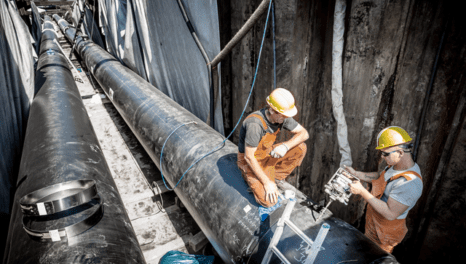Open data could save UK heat networks £400 million in 10 years
The use of open data by heat networks could save the emerging heat market £400 million and 800,000 tonnes of CO2 over the next 10 years, according to new analysis.
15th August 2016 by Networks

Research has shown that by sharing data on the sources of system inefficiencies, new and existing UK heat networks could save hundreds of millions of pounds.
The findings spring off the back of a government funded research programme known as Pinpoint (see Network issue 02 ‘Pinning down performance‘). This initiative was led by clean tech firm Guru Systems and supported by the Open Data Institute (ODI). It involved gathering consumption data across dozens of UK heat networks to diagnose hidden inefficiencies and generate suggested interventions.
Findings from the Pinpoint project are now available to industry as part of an open data agreement which Guru Systems managing director Casey Coles said is “key to helping the UK energy sector deliver cheaper, more efficient heat to people living on heat networks across the country.
“By releasing anonymised consumption data we have been able to show operators, designers and subsequently customers what good looks like.”
Explaining the fresh insights into the scale of opportunity for heat network efficiencies Cole added: “The majority of the £400 million in projected savings comes from a reduction in the oversizing of networks as well as increased fuel efficiency across the lifetime of these new systems.”
Guru Systems has calculated that due to the use of outdated and inaccurate modelling methods, heat network developers generally oversize UK installations by around 30% leading to excessive expense on central boilers and pipe work as well as performance issues when the system becomes operational.
The new data made available via the Pinpoint project should enable developers to avoid such oversizing and clearer expectations for system performance and heat tariffs. Jeni Tennison, technical director at the ODI said the information could “have significant economic and environmental impacts on a macro scale,” benefitting the energy industry as a whole and the nascent heat sector in particular.
Comments
Login on register to comment
Related content

Heat
Electric storage heating – a Cinderella solution
Why has electric storage heating been overlooked as we seek to tackle decarbonising domestic heat?

Heat
Prospects bright for landmark East London Heat Network
New Vattenfall-Cory partnership marks step towards record-breaking heat network capable of serving over 10,000 homes

Heat
New construction director at Switch2 Energy
Appointee brings experience from Vattenfall and Eon
Related supplier content
![‘Learning by doing’ on the road to net zero [test product]](https://networksonline.s3.amazonaws.com/products/images/3.jpg)
People & Skills
‘Learning by doing’ on the road to net zero [test product]
DSO director Andrew Roper discusses 'Learning by doing'

Power
Load patterns and lockdown: how Covid-19 is impacting electricity networks
Insights into dynamics on the low voltage network as the outbreak unfolds

Downloads
Protect electrical equipment from insulation failure
Insulation faults are a major cause leading to the eventual failure of electrical equipment. Partial discharge (PD) is a very reliable indicator of developing insulation faults. Regular PD testing allows users to detect and analyze PD activity